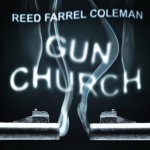Between the Lines Interview with Reed Farrel Coleman by Brett King
 By Brett King
By Brett King
There was a time when the face of crime fiction was a hardscrabble detective—a loner, usually—who solved crime after crime on a shoestring budget and a diet of black coffee, whiskey, and cigarettes. Hardboiled fiction was born during the Jazz Era and came of age during the Great Depression when iconic characters such as Sam Spade, The Continental Op, and Philip Marlowe enthralled readers of pulp magazines like Black Mask and Dime Detective.
Almost a century later, the legacy of hardboiled fiction is very much alive in the work of Reed Farrel Coleman. As a student at Brooklyn College, he discovered his calling during a night class in detective fiction, studying grandmasters like Dashiell Hammett and Raymond Chandler. Since that time, Reed has published fourteen books including two stand-alones and three series. His novels have made an impact. National Public Radio’s Maureen Corrigan called him a “hard-boiled poet”and the Huffington Post has named him a “noir poet laureate.”
Reed’s latest book, HURT MACHINE, stands as the seventh book in his celebrated Moe Prager series. Although Prager fits the archetype of a hard-boiled detective, he’s a fresh and engaging addition to the genre. As an ex-cop turned private investigator, Prager is a tough-minded thinker, a philosopher with street smarts. Booklist notes that, “His bone-deep world weariness and mordant sense of humor should enthrall lovers of old-school, tough-talking, loner private eyes.”
HURT MACHINE opens with a line from Wittgenstein that, “Death is not an event in life: we do not live to experience death.” The quotation underscores a dramatic period in Prager’s life. In addition to his daughter’s wedding, he’s coming to grips with a “malignant lump growing inside [his] belly.”Occasionally flinty but now more fragile, Prager is forced to confront the challenge of age and illness. At the same time, he reconnects with Carmella Melendez, his ex-wife and former partner, who is troubled by the homicide of her estranged sister. Seeking distraction, he joins Carmella in the search for her sister, but soon uncovers a bedrock of bureaucratic greed, sexual harassment, and blackmail. In his unflinching portrayal, Reed brings to life this moment in Prager’s world with poignancy and gritty insight.
Reed is an adjunct professor at Hofstra University where he teaches writing courses in mystery fiction and the novel. He lives with his family on Long Island. In candid style, he shared the broad influences that went into the creation of his books as well as his thoughts about writing, teaching, and hardboiled fiction.
Your novels have a decided New York sensibility. How did your childhood in Brooklyn shape your perspective about the world?
It shaped everything about me. From the take no prisoners attitude everyone seemed to have to the sad sense that we had all missed the real glory days of Brooklyn, my mind was molded by where I grew up. If you go to my website and see the videos of me in my old neighborhood, you’ll understand why I write what I write. Coney Island was such a perfect setting to help shape the mind and heart of a future mystery novelist and an even better place to set his novels.
Growing up, were you a good observer?
Still am a watcher, an observer. I describe it as always sitting on my own shoulder.
Let’s talk about that detective fiction class at Brooklyn College. What came alive for you in that course?
The poetry in the rhythm and language of Hammett and Chandler. I’d been trained as a poet, but knew I wasn’t good enough at it to make something of myself. Then, when I read the classics in the genre, I knew my training hadn’t been wasted. I thought, man, I can do this. I want to do this. I have to do this.
 On that topic, was there an event in your background that placed you on course to becoming an author?
On that topic, was there an event in your background that placed you on course to becoming an author?
One incident in particular, yes. At least in terms of becoming a crime fiction writer. When I was fifteen, I witnessed a stranger die of a gunshot wound. I was no more than five feet away from him when he stopped breathing. It had a profound effect on me. I wrote an essay on the subject in Brooklyn Noir 3 and have a poem inspired by the incident published in The Lineup. If you want to hear the whole story, you can view a video about it on my website. It’s too long to tell here.
From Coney Island to the Catskills, your novels contain rich descriptions of setting. When it comes to physical descriptions of your primary characters, however, you provide little detail. Tell us about that.
You caught me! Yes, I try not to over-describe my main characters because I want my readers to participate in the process. I want them to see who they want to see and hear the voice they create for the character. Although I admire music written for movies, I feel very dubious about it. I don’t like being told by the music how to feel. In the same way, I don’t want to tell the reader Moe looks like this or that or sounds a certain way. I want them to create along with me.
The title of your latest book comes from your line, “Humans are like hurt machines. No matter how hard we try not to do it, we seem to inflict hurt on one another as naturally as we breathe.” It’s a telling statement because Moe Prager has faced his share of volatile relationships. What do you do to ensure that readers will be interested in your character’s relationships?
I write the best books I can write and hope people care. I figure if I still care after all these books, maybe the readers will too. I find I’m good at poignancy in my work. I think that’s my way into a book and into the readers’ hearts and minds.
Prager describes himself as a “pragmatic SOB.” True for you as well?
Guilty as charged. I have a low bullshit threshold, especially if it causes inaction. If there’s a problem, let’s solve it. We waste so much time affixing blame that it drives me to distraction.
How does the cancer diagnosis change Prager’s perspective about himself?
Well, it’s one hell of a wake up call, isn’t it? It forces him to reassess and to come to terms with unresolved feelings and issues. What I like is that Moe has to do this as he comes to grips with the case he’s working, so that he’s working on several levels at once. This book has more than one antagonist. Cancer is only one of them.
You’ve infused Prager with a gritty, but poetic warmth. What advice would you offer to aspiring writers on creating memorable and lucid characters? How do you get inside their heads?
Great questions. I take the method actor’s approach to characters. I despise characters that are created simply to fill a role. I want characters that bleed, that are created from the inside out, not the outside in. What we feel is what makes us human. Why would that be any less true for characters? Yes, I want to know what’s in a character’s refrigerator and wallet. But more importantly I want to know what’s in their hearts.
In his “Twelve Notes on the Mystery Story,” Raymond Chandler argued that a compelling mystery “must baffle a reasonably intelligent reader….[T]here must be some important elements of the story that elude the most penetrating reader.” What steps do you take to baffle your readers?
You’re going to hate me, but I don’t construct my books that way. I try and keep myself only one step ahead of my writing and in this way hope to keep the readers interested.
Chandler adds, “The perfect detective story cannot be written. The type of mind which can evolve the perfect problem is not the type of mind that can produce the artistic job of writing.” Do you agree?
I love Chandler as a writer, but he could also be an anti-Semitic, pompous ass. Some of what he said was relevant, some not. Frankly, I’m not terribly interested in his pronouncements or any other writer’s pronouncements on what should or shouldn’t be.
In your opinion, what is the most important reason for the continuing appeal of hardboiled mysteries?
Because the PI is the perfect vessel in which to pour the frustration of a generation. The PI will always be the one against the many, the individual against the state, the dissenter against the masses. The PI works according to his own code, the rest of the world be damned. There is something so incredibly romantic and attractive about that. Ayn Rand’s novels are based on that very same magnet.
What are your thoughts about the future of hardboiled fiction? Will there always be a demand for noir and hardboiled stories?
After dissing Raymond Chandler, I’m not sure I should be making broad pronouncements or prognostications. I do think, however, these subgenres will persist and flourish. For my sake, I hope they do.
Moral ambiguity plays a role in some hardboiled stories. How do the ethics of the hardboiled detective match up with the rest of the world?
It’s one of the great things about the genre that the consensus of right and wrong is not at issue in the moral code of the PI. His code is a result of his or her experiences, not what the local priest or rabbi had to say. This goes back to my calling Moe Prager a pragmatic SOB. His ethics are his own: part cop, part religious, part experience, part romance … Whatever it is, it ain’t store bought.
That touches on another question I have about the psychological makeup of a hardboiled protagonist. Can you comment on their obsessive side? Some hardboiled detectives have an obsession for finding an answer even when everything around them is going straight to hell.
But I think that’s what we all do, really. I lived through almost six decades and most of that time it’s seemed to me the world was going to hell. Yet, I see people get up everyday, feed their kids breakfast, send them off to school, go to work … I think that’s part of the attraction of PI novels. Whereas people carry on in spite of all manner of horrors, they can’t find answers. The PI, however, holds out hope to the reader that there are answers and that someone with a little bit of courage, determination, and guts can find them.
Staying on that topic, what role does suspicion about trust play in the genre? A common theme in hardboiled fiction seems to be that you can’t trust anyone.
It’s a theme in life. I’d like to put it another way. One of my themes is that no one knows anyone well enough to say, “He would never do that.” You don’t even know yourself well enough to really know what you’d do in most supremely stressful circumstances. And it follows that if you can’t know yourself well enough, is there anyone you can trust?
Your Hofstra course on mystery fiction sounds fascinating. What is a critical insight that you share with your students about the mystery genre?
Don’t quit your day job. Actually, my advice is for all writers just starting out. Fall in love with writing, not with what you’ve written.
What do you find is the most common mistake your students make?
My class is open to undergrads, grad students, and continuing ed students. Interesting mix. Even so, their most common mistake is believing that writing is easy. They soon find out it ain’t.
Your protagonist is moving toward a more vulnerable time in his life. Where are you at during this stage in your life? Are you a tough guy or a big softie?
Depends on the circumstance and pov. In some ways, I’m a big softie, I guess. But I drove a truck for seven years and delivered home heating oil in the northeast in the middle of winter. You do that for a while and you realize what toughness is. Toughness isn’t carrying a gun. Toughness is delivering oil in a rough neighborhood in zero degrees with three thousand dollars in cash in your pocket.
Prager uses his well-honed wit as tool for commentary, but it also masks his growing vulnerability. Do you use humor in the same way? Does it shield you?
Humor is a shield for almost everyone. I use it in a way just like Moe. No, wait, he uses it like me.
*****
 Reed is a three-time winner of the Shamus Award for Best Detective Novel of the Year. He also received the Macavity, Barry, and Anthony Awards, and is a two-time Edgar Award nominee. He was co-editor of the poetry journals Poetry Bone and The Lineup and the editor of the short story anthology Hard Boiled Brooklyn. His novels have been translated into seven languages.
Reed is a three-time winner of the Shamus Award for Best Detective Novel of the Year. He also received the Macavity, Barry, and Anthony Awards, and is a two-time Edgar Award nominee. He was co-editor of the poetry journals Poetry Bone and The Lineup and the editor of the short story anthology Hard Boiled Brooklyn. His novels have been translated into seven languages.
In bookstores now, HURT MACHINE is a compelling read from a master storyteller. If you haven’t been introduced to Reed Farrel Coleman, you owe it to yourself to check out his work. In a starred review, PUBLISHER’S WEEKLY raved that “Razor-edged contemporary whodunits don’t get much better than Shamus-winner Coleman’s seventh Moe Prager mystery.” Read the book. I think you’ll agree.
To learn more about Reed, please visit his website.
*****
 Brett King is an award-winning professor in the Department of Psychology and Neuroscience at the University of Colorado Boulder. His debut novel, THE RADIX, appeared in 2010 and was released in trade paperback in October 2011. NEW YORK TIMES bestselling author Jeffery Deaver calls it, “A topnotch thriller! Part DA VINCI CODE, part 24, THE RADIX is roller-coaster storytelling at its best.” The second book in his series, THE FALSE DOOR, will be released in June 2012. King is currently writing his third novel.
Brett King is an award-winning professor in the Department of Psychology and Neuroscience at the University of Colorado Boulder. His debut novel, THE RADIX, appeared in 2010 and was released in trade paperback in October 2011. NEW YORK TIMES bestselling author Jeffery Deaver calls it, “A topnotch thriller! Part DA VINCI CODE, part 24, THE RADIX is roller-coaster storytelling at its best.” The second book in his series, THE FALSE DOOR, will be released in June 2012. King is currently writing his third novel.
To learn more about Brett, please visit his website and his author page on Facebook.
- A Between The Lines Interview with Andrew Peterson by Brett King - March 31, 2014
- Between The Lines Interview with Lisa Scottoline by Brett King - October 31, 2013
- Between the Lines Interview with Erica Spindler by Brett King - July 31, 2013
